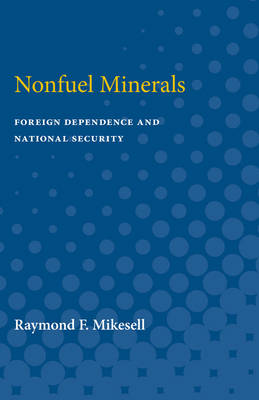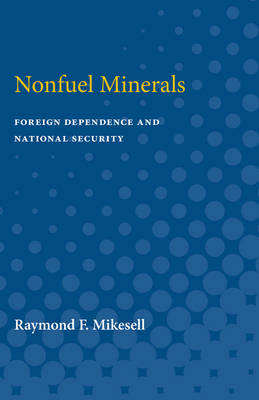
Bedankt voor het vertrouwen het afgelopen jaar! Om jou te bedanken bieden we GRATIS verzending (in België) aan op alles gedurende de hele maand januari.
- Afhalen na 1 uur in een winkel met voorraad
- In januari gratis thuislevering in België
- Ruim aanbod met 7 miljoen producten
Bedankt voor het vertrouwen het afgelopen jaar! Om jou te bedanken bieden we GRATIS verzending (in België) aan op alles gedurende de hele maand januari.
- Afhalen na 1 uur in een winkel met voorraad
- In januari gratis thuislevering in België
- Ruim aanbod met 7 miljoen producten
Zoeken
Nonfuel Minerals
Foreign Dependence and National Security
Raymond Mikesell, Raymond F Mikesell
Paperback | Engels
€ 60,95
+ 121 punten
Omschrijving
In an uncertain international economic environment, the United States is increasingly dependent upon foreign suppliers for many things, including nonfuel minerals. This book deals with the major problems and policy issues involved with these minerals. The major problems concern the medium- and long-term availability of world supplies, the competitive structure of nonfuel mineral industries, and the location of world production and consumption. Special attention is given to the production of nonfuel minerals in developing countries and the role of foreign investment in Third World mineral industries. The major policy include reducing U.S. vulnerability to disruption of imports of nonfuel minerals; subsidizing, or protecting against imports, domestic producers of nonfuel minerals; conflicts between environmentalists and the mining industry; and international loans to Third World metal-producing countries. While the treatment of conflicting policy positions is objective, the author comes out on the side of unrestricted competition in world markets, including elimination of domestic subsidies to import barriers, the use of economic stockpiles to reduce vulnerability to import disruption, and maintenance of strict environmental pollution standards. The author is optimistic about the long-run outlook for mineral supplies necessary to meet world requirements for economic growth. United States domestic mineral independence may be unnecessary in terms of national security and too costly to consumers and the environment.
Specificaties
Betrokkenen
- Auteur(s):
- Uitgeverij:
Inhoud
- Aantal bladzijden:
- 270
- Taal:
- Engels
Eigenschappen
- Productcode (EAN):
- 9780472751853
- Verschijningsdatum:
- 1/01/1987
- Uitvoering:
- Paperback
- Formaat:
- Trade paperback (VS)
- Afmetingen:
- 152 mm x 229 mm
- Gewicht:
- 399 g

Alleen bij Standaard Boekhandel
+ 121 punten op je klantenkaart van Standaard Boekhandel
Beoordelingen
We publiceren alleen reviews die voldoen aan de voorwaarden voor reviews. Bekijk onze voorwaarden voor reviews.









